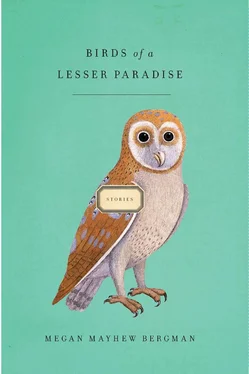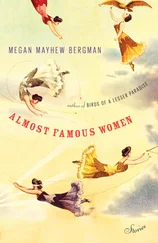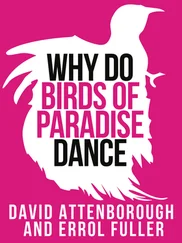If he was smart, he wouldn’t do it. I knew that. He’d get into trouble; I was too young. But I liked the idea, the heat it generated in my body.
I pushed on. The skin on my face was so cold that it moved in slow motion. My boots weren’t waterproof and my feet were starting to feel damp and numb. Erik once told me never to come into the woods without a leather belt, that with a belt you could do anything.
When under attack, he’d said, hold it in front of you for the animal to bite, then strangle the bastard.
I felt my waist. Bare.
A few hundred yards and I’d be near the Wells’s old dairy, the yard where Millie had fought off the cougar with her bare hands and soft voice. So this was Vermont in the dead of night — wild, beautiful.
A snow plow seemed to appear out of nowhere on the road nearby, metal against ice. The sound sent something flying through the woods on my right.
I stood, motionless. I had to remind myself to breathe.
I thought of Mom then. How brave she’d been this year. I thought of the night she’d come sprinting back to the trailer in Utah, sobbing, her pant leg soaked in blood, saying: Aida, Aida. I thought of the way the painkillers took something out of her, put a crazy look in her eyes, the way she gripped the backs of chairs and stood with her teeth clenched while the tumors inside of her grew.
The rustling stopped. It seemed as if the snow had muted everything around me — the birds, the road, the wind. I saw thin strips of smoke rising on the hill, wood fires dying as people slept beneath their thick winter quilts.
I knew I couldn’t stay in one place for long with my feet this cold. I stumbled through the pasture, backtracking. I paused and listened. Nothing. I went on. I paused again. I was convinced I heard the soft shuffling of feet in fresh snow. I groped around in Mom’s pockets and found her penknife. I switched open the blade and began to run.
For maybe half a second, it occurred to me that I could die, maybe from the cold, maybe from something worse, and that if I did, I wouldn’t have to live through my own mother’s death. But then I pictured her face, how tired she was, and I knew I couldn’t let it happen. I’d been looking for a fight, and maybe I’d found one.
I stopped at the creek that branched down the hillside and into the valley. In the dead of winter it would be frozen over, the ice blue and warped by rocks. But for now it was moving too fast to freeze and I could hear it, full from the snow and late-fall rains. I stood on a slick rock in the middle of the creek, trying to regroup. The cold adrenaline made my body feel electric.
I heard the coyote huffing, sucking in air and releasing a series of small yips. Large, white, and graceful, she trotted past me, circled back, and stood on one side of the creek. Her three pups followed. She curled her lip. She was close; it would take nothing for her to lunge at me. I didn’t know whether the water would stop her.
I could see her eyes shining gold. My stomach plummeted; my mind and heart began to race.
Get the fuck out of here! I tried to shout, but my voice was small and scared.
I put the knife in my mouth and without breaking eye contact I stooped to pick up a large rock. My fingers went numb in the water.
I’d always hated my grandfather’s hunting. I’d never understood how he could kill another living being, not until this night, when, for the first time, I realized I might do anything to survive.
The coyote paced the bank and came close enough for me to strike. We were both desperate. Her eyes locked on to my body. I was sure she wasn’t going to let me pass, and still I hesitated. I didn’t want to hurt her. She came closer. Her lip curled.
I thought, then, of Mom coming into the trailer in Utah, her leg covered in blood. I thought about the way she avoided the backyard after twilight now, sick and lacking the strength to face down her fear.
I hurled the rock and hit the coyote on the right side of the head. She went down. She’d begun to pull herself back up when I took off. She was plenty big, but smaller than people said she’d be.
I ran with her eyes at my back. I ran for ten minutes, tripping over rocks and roots. I didn’t find the ATV trails. I bushwhacked, prickers dragging across my pants. I was breathing hard. My extremities began to warm. Blood began to seep from my right hand.
Without realizing it, I had clamped down on the open switchblade.
As I ran, I thought of the bare skin on the underside of a dog, the vulnerable patch of naked flesh on the torso and hind legs. I pictured the coyote bitch rolled on her side, her pups curling against her body, taking the last of her warmth. She would give it to them; she would give them everything.
I broke through the woods and spotted our house, a white farmhouse, faintly lit from within. The woodstove chimney sent up a sad stream of smoke, the fire nothing but cinders by now. My fear was beginning to turn to grief, my thoughts to the wounded coyote whose pups wouldn’t make it through the winter. I thought of my mother in bed and hoped she was still asleep. I thought of the wild cells ravaging her body without pause.
The dogs sensed me coming through the woods; I could hear their muffled barks, and, as I neared, their claws digging at the front door.
I stripped down and left Mom’s coveralls on the floor. I wrapped a washcloth around my hand to stop the bleeding. Shivering, I opened Mom’s bedroom door. She was sitting up in bed, still in her faded party clothes, her arms outstretched. I went to her. She pulled me against her body, as she had done when I was a child, and held me there, in the cave of her chest, in the place of everything that was missing.
He left when Salli, the one-eared retriever, ate one-third of his leaf collection.
She has separation anxiety, I said, pleading her case and mine. She was abandoned, attacked by a pack of dogs and left for dead.
What kind of house is this? he asked.
The technical answer: A Victorian Queen Anne with stick detailing in the gable. A spindled gingerbread in disrepair.
Gray was referring to the three golden retrievers in various states of decline — Salli with her missing ear and lumps of scar tissue, paralyzed Prince dragging his cart down the hallway, toothless and epileptic Sam dreaming wild on the kitchen floor. Or, it might have been the declawed raccoon marauding in the living room. The one-eyed chinchilla nesting in cedar chips in what could have been the nursery. I didn’t count the feral cats — they lived underneath the sofa, largely out of sight.
Before he left, we had spent a day at Lake Mattamuskeet, collecting what Gray called “complete leaves”—leaves undamaged by frost or insect.
Ideally, he had said, we want the entire leaf, a small part of the twig, and a terminal bud.
Mattamuskeet was a mosquito-filled wetlands depression surrounded by flat farmland and hunting clubs. Just deep as a swan’s neck, Gray had said.
I tried not to think of the hidden predators — red wolves behind the tree line, alligators in the marshlands, as I stood next to Gray in a patch of wild millet.
Don’t get me wrong, I told Gray, I love predators. I’m just intimidated by teeth.
You should think about getting rid of that chinchilla, he said, waving a bandaged finger at me. What good is a snap-happy, one-eyed chinchilla?
Gray reached for the triangular toothed leaf of an eastern cottonwood with his pocketknife shears. In the distance I could see a great blue heron standing awkwardly in the water. A cormorant floated by, and I wondered what it would be like to be aerodynamic, to shoot through the water like a bullet.
Hand me the magazine, Gray said, looking down at me from his portable ladder.
Читать дальше












